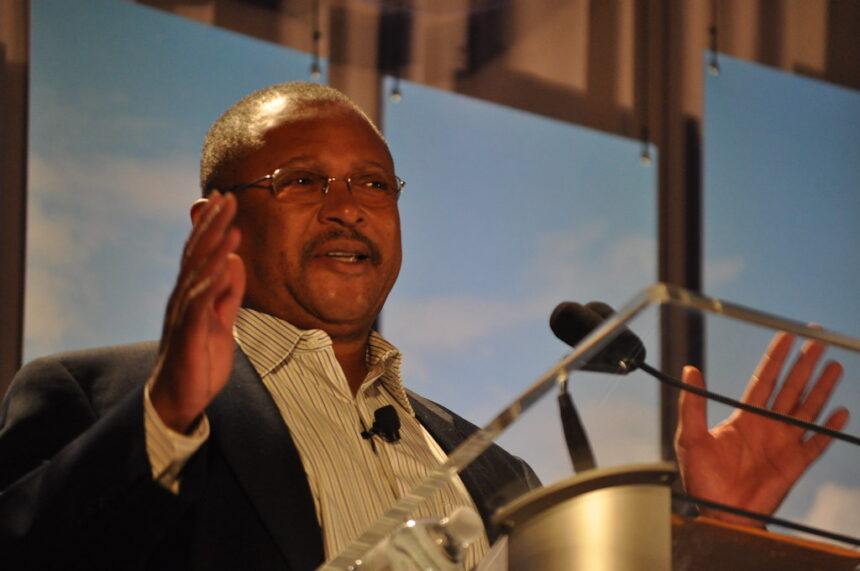The issue of inflation has long been one that Americans have worried about. It was also a major factor in Donald Trump’s victory at the presidential elections held in 2024.
Now that Trump is back, it’s time to ask: Will inflation continue or even increase under Trump’s policies?
Trump’s plans, from tariffs on imported goods to changes in the Federal Reserve system, could directly affect consumer prices and purchasing ability.
Americans hope that Trump can achieve strong economic growth without inflaming inflation.
But if he raises prices, his popularity could quickly drop.
What can Trump’s plans for economic growth mean for the inflation rate?
Trump’s economic past and future policies indicate areas in which inflation could increase.
His commitment to higher tariffs for imports from China, in particular, has played a significant role in his campaign.
Trump suggested tariffs of up to 60% on Chinese products and on various imports.
Tariffs on imported goods tend to increase consumer prices, according to National Bureau of Economic Research. Companies pass the higher costs on to consumers.
It could affect the cost of living for Americans by increasing prices on everything, from household items to electronics.
Trump’s influence on the Federal Reserve is another inflationary threat.
It could result in more fiscal stimulus than usual if he presses the Fed for low interest rates or aligns them with his economic goals.
Low rates can encourage more borrowing and spending in the economy. This could lead to higher prices.
The 30-year Treasury Bond yield in 2024 saw the largest rise since two years. This is a sign of market expectations for inflation, due to potential government spending under Trump.
Some traders are predicting that Trump’s policy may cause inflation to continue or increase.
A Fed in control, trade wars and tax cuts could cause inflation to spiral quickly out of control.
Focus on jobs and deregulation
Trump campaigned on a promise to lower regulations for major industries such as energy, banking and technology.
Deregulation can lower costs and create jobs, as well as lead to growth for sectors such as fossil fuels, finance and cryptocurrency.
As a result, oil and gas shares have seen an increase in value, since the market is expecting a drilling-friendly administration. How would inflation be affected?
These policies can indirectly contribute to inflation, even though they may in the short-term encourage job growth and business expansion.
In an economy with low unemployment rates, for example, the competition between companies to hire workers could lead to higher wages in sectors that are deregulated.
Increased wages can result in higher costs for goods and services. This would increase pressure on price.
Analysts say that although deregulation may initially reduce costs to businesses, the effect on prices for consumers is not certain.
Tariffs, monetary policy and other factors can also drive prices up.
What is the impact on labor of immigration restrictions?
Trump’s plan to deport undocumented immigrant workers in mass could cause labor shortages for industries that heavily depend on their labor.
The American Farm Bureau Federation estimates that around half of the farm workers in the U.S. do not have legal status.
The shortage of agricultural workers would reduce the food supply, and likely increase prices.
A similar impact could be seen in industries such as construction.
Construction costs could rise if there is not enough labour, making housing more expensive, especially at a moment when rates of mortgage are high.
The cost increases in these sectors would have a significant impact on inflation.
Trump’s import tariffs are intended to promote domestic manufacturing, and to bring jobs to American soil.
This could create new jobs in the industrial manufacturing sector, and offset some job losses elsewhere.
It’s not clear if these manufacturing jobs will be sufficient to fill the labor gap in construction or agriculture, which are two industries that could see a surge of deportations.
What is a central bank controlled by the government?
Trump criticized the Fed’s interest rate hikes in his first term. He claimed that it hampered economic growth.
It could lead to Fed policy being influenced by his attempts to nominate Fed officials more in line with his views on economics, even if inflationary risk is present.
The approach can expand the economy through increased spending and investments, but it could also lead to higher prices if inflation is not controlled.
Federal Reserve rates are adjusted based on inflation and data.
If Trump has a significant impact, the Fed may prioritize price stability over economic growth.
Some analysts have called this a Trump-Whim economy where the risks of inflation increase when policies are not data-driven.
Which is more important to Americans: unemployment or inflation?
Inflation is more important to Americans than unemployment when it comes to their economic priorities.
The impact of unemployment is more pronounced on the directly affected than those who are indirectly affected.
Inflation can make basic products more expensive, leading to widespread dissatisfaction.
Inflation played an important role in past elections such as Richard Nixon’s victory in 1968 or Ronald Reagan’s in 1980.
These two elections were held during high inflation periods, demonstrating that people react strongly to the threat of losing their purchasing power.
Trump’s administration will need to balance the goals of creating jobs and deregulating regulations with controlling inflation, because Americans might not tolerate policies which lead to higher prices.
Trump’s policies could have a negative impact on the American economy.
While increased tariffs may benefit American manufacturers, it will also affect consumer prices, causing inflation.
The deregulation of the economy could lead to job creation, but it may also cause wage inflation. Immigration policies that result in a shortage of workers could increase the cost of housing and food.
Trump’s ability to meet the economic needs of his voters will ultimately depend on how well he manages inflationary pressures, while also supporting job growth.
The question that Americans are most concerned about is whether inflation will remain high during Trump’s second tenure. This post may change as new information is revealed
This site is for entertainment only. Click here to read more






